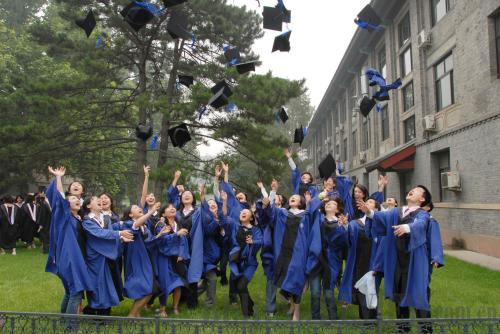|
 |
|
WE DID IT!: Master of Arts students at Peking University celebrate their graduation on June 30, 2008 (CFP) |
Establishing a university outside the government bureaucracy has long been a dream of Zhu Qingshi, former President of the University of Science and Technology of China (USTC).
Zhu, a leading chemical physics researcher, is an academician of the Chinese Academy of Sciences.
On September 10, 2009, the chance fell into Zhu's lap. He was appointed founding president of the South University of Science and Technology of China (SUSTC) being built in Shenzhen, south China's Guangdong Province.
"We aim to build the SUSTC into a first-class research-oriented university in Asia in one go," Zhu said.
Being chosen
The plan to build SUSTC originated in 2004. In July 2008, the Shenzhen Municipal Government set up a selection commission to choose the founding president of the institution. After more than one year of consideration, Zhu was given the job.
According to him, the selection commission consisted of presidents of China's well-known universities, educators and scientists.
It was also the first case in China in which a university president was selected with the assistance of an international human resource consultant institution.
The 64-year-old Zhu, a reform-minded educator, has always been a hot topic in China.
In 1998, Zhu was appointed president of USTC. In the following 10 years, he refused to enlarge the campus and its enrollment, making USTC the only major university in China that did not do so.
To expand access to higher education, China launched a program to boost university enrollment in 1999. Since then, the number of students enrolled in college has sextupled, rising from 1.08 million students in 1998 to 6.57 million students in 2010, according to official statistics.
Zhu has also constantly expressed his frustration toward the heavy bureaucracy at China's higher-education institutions, which he believes is mainly responsible for China's lack of world-renowned scientists.
Universities in China, most of them public-run, are managed in a way similar to government organs—where government-appointed school leadership decides virtually everything involving school affairs. Usually, leaders of Chinese universities are given administrative grades as government officials.
A first-class university
A performance-based school, instead of a rank-based institution, should be established, and respect will go only to those who are outstanding in their research, teaching or administration, Zhu insists.
As president of a new university that is expected to be more liberal, Zhu finally found the opportunity to run its administration based on his understanding of the true nature of modern higher education, in particular, the pursuit of "academic freedom, autonomy and professorial governance."
In March, China made public a government plan on education reform, which included a statement to gradually call off administrative grades among university management and give academia more authority to run their schools.
To ensure academic freedom, Zhu told the Shenzhen News that SUSTC would be governed by a council composed of provincial and municipal officials, community leaders and representatives from faculty and students. The council would appoint the school leadership, but it would not intervene in day-to-day affairs or academic matters.
Whether SUSTC can meet Zhu's ideals hangs on the school regulations that are being formulated. Upon completion, the regulations will be referred to the local legislature to be passed, as Zhu believes only laws and regulations can protect university autonomy.
"We are taking it slowly. Given its importance, we cannot afford any missteps. The regulations would ensure school governance by its professors and autonomy in academic affairs by establishing a system in which the roles of the government and the school are clearly defined," he told the Economic Observer.
Just recognized by the Shenzhen Government as a legal entity, SUSTC is recruiting world-class scientists with attractive pay offers and plans to enroll its first class of 50 students this fall.
Professors at the school would earn no less than their counterparts in the Hong Kong University of Science and Technology, and the school is in contact with some big names both from home and abroad, according to Zhu.
The university was also preparing to set up a foundation to solicit and manage donations. Several entrepreneurs in Shenzhen had pledged large sums, enough to cover all costs for students.
"We are trying to establish a small-scale school like the California Institute of Technology, where faculty and students enjoy utmost freedom and autonomy in research and study, an environment that breeds true major academic achievements," he told China Youth Daily. | 